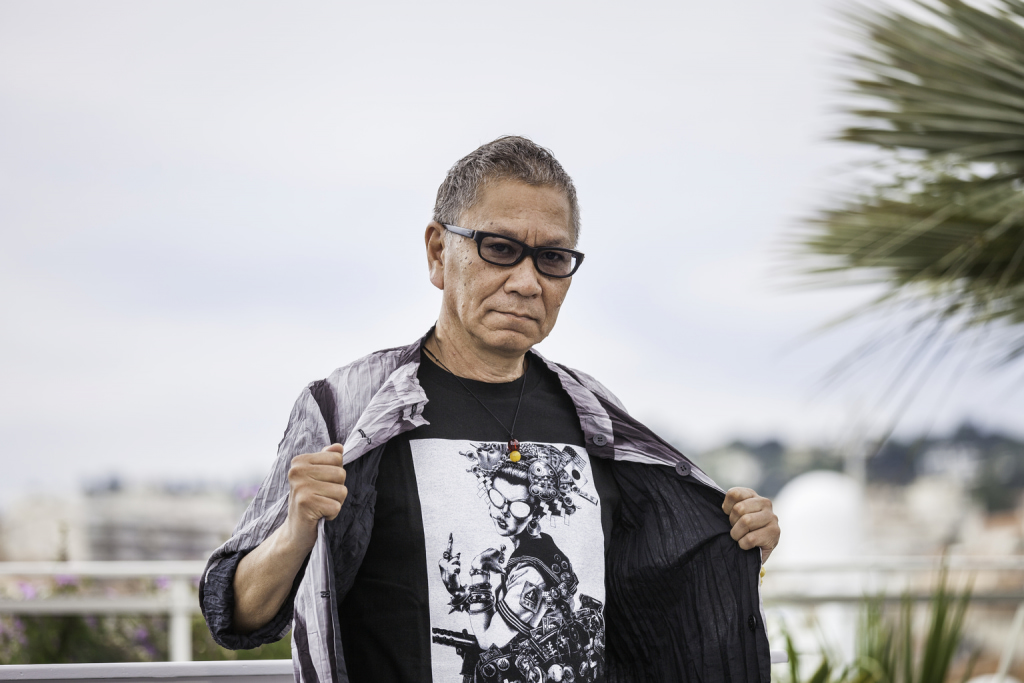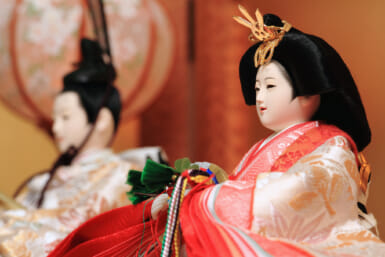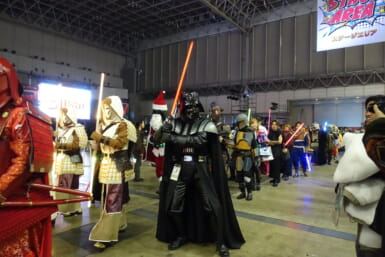There’s an inherent, undeniable link between comedy and horror. One only needs to look at, say, Alfred Hitchcock. The master of terror and suspense had a darkly humorous side exemplified by his iconic “Cure for Insomnia” sketch. A more recent example might be Jordan Peele, who rose to prominence as one half of the titular comedic duo of Key & Peele before moving to direct some of the most acclaimed horror movies of the 21st century like Get Out and Us. And then there’s the controversial Japanese filmmaker Takashi Miike. The director described as ultra-violent by Quentin Tarantino is also into kawaii, it turns out.
Miike’s Rise to Horror Fame
Miike is perhaps best known for his 1999 horror movie Audition, a masterpiece of pacing, suspense, and torture scenes that once seen can never be unseen. If you want proof of that, find someone who’s seen it and mention “the needle scene,” then watch them visibly wince. Miike’s 2001 film Ichi the Killer was definitely less refined, but surely grabbed everyone’s attention again. What it lacked in subtlety, it made up for with even more disturbing scenes of torture and mutilation, which has probably forever ruined tempura for many people. Notably, 13 Assassins in 2010 cemented Miike’s cult following in the West, in addition to his popularity back home.
Another worthy mention is One Missed Call (2003), possibly one of the greatest Japanese horror movies ever made. The film doesn’t rely on gore to instill a feeling of dread in the audience. Rather, it uses supernatural elements as an excuse to explore the darkest corners of the human psyche. One Missed Call is essentially a masterclass on how to do Japanese horror right. From its twisting of technology—a symbol of modernity and safety in modern Japanese society—into something deadly and sinister, right down to the supernatural force in the film being unstoppable. It may sound simple, but it’s incredibly difficult to get those elements exactly right. The American remake of One Missed Call failed so hard to understand that. As a result it now has a zero percent Rotten Tomatoes rating and is widely considered one of the worst remakes of Japanese horror ever.
Miike’s Always Been More than a Horror Director

Miike is the undeniable king of horror. But, at the same time, it’s not right to pigeonhole him solely as a horror director. He’s also really good at the lighter stuff. In fact, his very first film, Eyecatch Junction (1991), was a raunchy goofball comedy apparently inspired by all the sex scenes from Police Academy.
Miike would go on to sprinkle a little bit of humor on his darker, more disturbing stories throughout his career. Examples include his 1996 film Fudoh: The New Generation, the darkly satirical Visitor Q (2001) and Zebraman (2004). None of those films really qualify as comedies but, the comedic elements are there. What definitely qualifies as comedy is Yatterman (2009). This is a slapstick live-action adaptation of the anime of the same name about fighting supervillains with an array of silly robots.
Miike has even tried his hand at directing an English language Japanese Western film: Sukiyaki Western Django (2007), with Quentin Tarantino in the film cast. If you think there’s too much happening in that sentence, prepare yourself for the trailer.
He also directed the 2011 self-explanatory family film Ninja Kids!!! and the 1996 comedy Peanuts. The latter is probably one of his most under-appreciated works. What’s great about it is that all the humor in it comes from human misery. It exemplifies Mel Brook’s famous quote: “Tragedy is when I cut my finger. Comedy is when you fall into an open sewer and die.” That’s Peanuts in a nutshell — pun intended.
The Cult Horror Director Switches to Magical Girl TV Shows
These days, though, Miike’s concentrating on his Girls x Heroine series. The “magical girl” franchise features a new elementary school or middle school-aged girl group with a different motif each season. One example is Police × Heroine Lovepatrina! Every incarnation of the show focuses on the group battling some kind of evil force while exploring themes more geared towards girls.
If you understand Japanese, you can hear Miike explain all about his new show below.
It definitely has comedic elements, but unlike Miike’s previous works, they’re not there to add light to an underlying, disturbing story. Girls x Heroine is a straightforward children’s show. It raises the question as to why has Miike’s been dedicated to it for the last four years.
It’d be tempting to try and find any links, no matter how superficial, between his horror films and the Girls x Heroine series. Or, to look for any hidden darkness in the latter. But the truth of the matter is much simpler: Miike’s a versatile, multi-talented artist. Indeed, he’s most famous for his dark horror movies, but has never restricted himself to any specific genre or aesthetic. He’s always tried out new things and genres. Sadly, this sometimes gets overlooked because of his accomplishments as a scare flick director. This could be seen when the world collectively shrugged at his touching drama The Lion Standing in the Wind (2015).
In the end, nothing that Miike does could ever be called surprising or unlike him. He’s tried his hand at everything and will hopefully continue to do so for the foreseeable future because the world of cinema will be better for it.
Japanese film fans might also be interested in:









